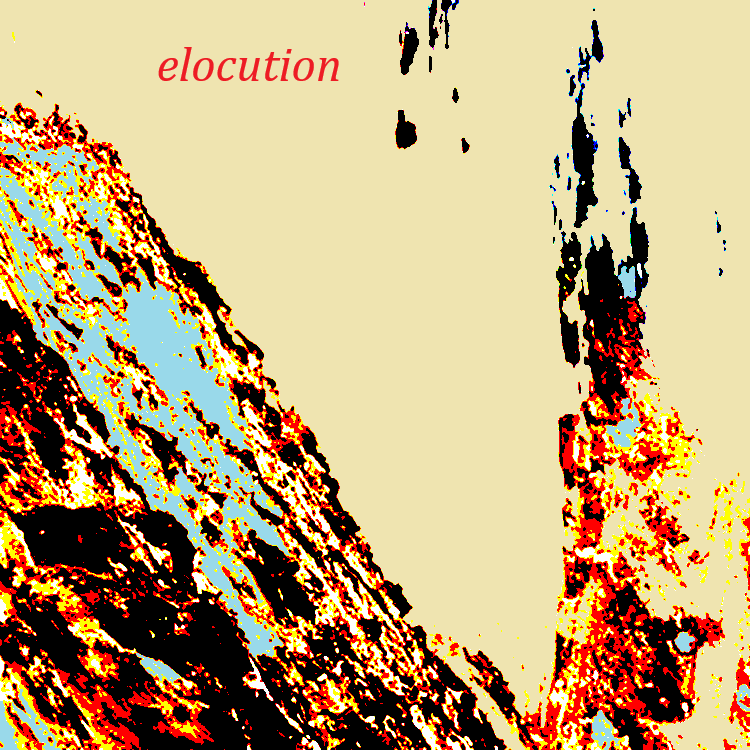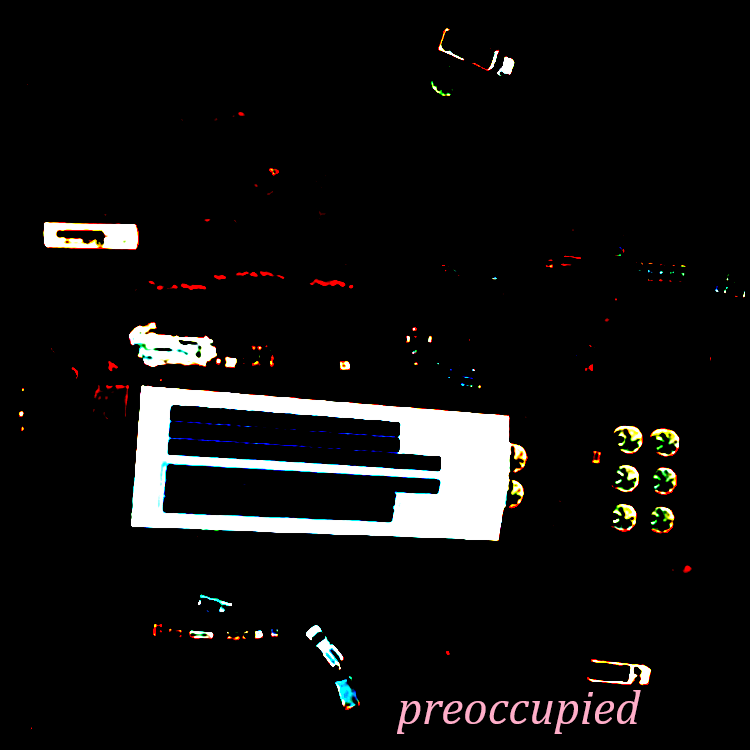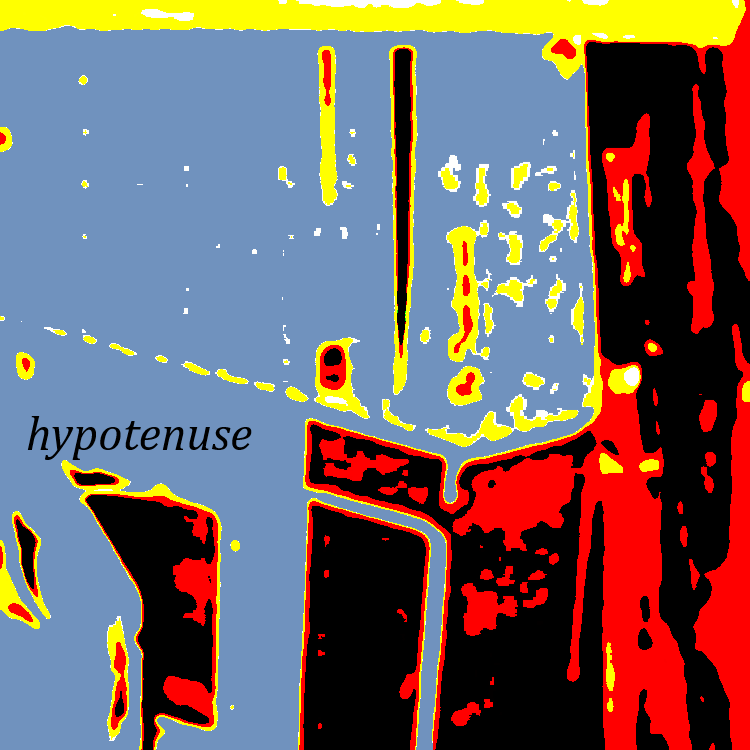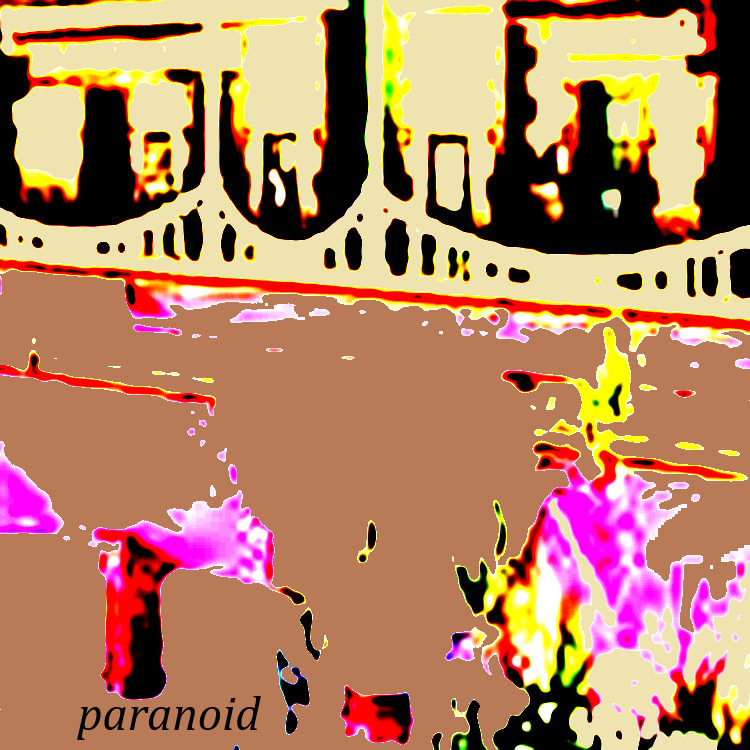Class of ’95
Alicia raced across the busy street, which was choked with after-the-bar traffic. She checked her watch: it was a quarter to 2am. Leaping from the pavement onto the curb, her foot slipped and twisted painfully on the wet grass.
“Shit,” she hissed, grabbing at her ankle. She cast a glance back the way she’d come. There was no one in pursuit–that she could see. Cutting cautiously across a residential property, Alicia heard a savage growl. Limping now, she was being chased by an angry dog. As the moon peeped out of the blue-gray cloud cover, she saw that her pursuer was but a tiny dog. It was angry, though, and loud.
“Here, you little creep,” she whispered, and turned up a candy bar from her purse and tossed it in the little dog’s direction. The creature halted at once and began greedily devouring the confection. Alicia plodded on, limping badly now.
Skulking through side streets, she at last arrived at the grocery store, where she found her car parked in the lot. Thank God, she thought. Glancing nervously around, she saw nothing suspicious, and approached the vehicle, her ring of keys clutched defensively in her hand. Turning over the door lock, she was startled when a hand reached out and grabbed her around the biceps.
Alicia reacted without thinking. Her self-defense training took over. She was about to break the assailant’s arm when the man she subdued said “Alicia, I’m sorry. This was a stupid idea. It’s Bill Stuart from high school. This was supposed to be a surprise. You look great and if anything have changed for the better.”
“Alicia released her grip and Bill stood up. Alicia half-smiled when she recognized him under the streetlamp and remembered that Bill was one of the guys that she silently crushed on in high school. Star football player who went to prestigious Galley College when he graduated from high school. She was surprised when Bill said, “You know I always kinda liked you but never spoke up.”
“Bill Stuart,” she marveled aloud. “It’s been what, nearly 18 years?”
Bill winced. “Yeah, ‘fraid so.” He stared frankly at her. “But, like I said, the years have been a friend to you.”
“Dan Fogelberg?” she asked, recognizing the quote from a song she’d always loved.
“Naw,” he said, “I made it up myself.” They both laughed. Next he asked, “what’re you doing out in the middle of night?”
Alicia hesitated for only an instant. “I was meeting a client,” she replied.
“What’re you,” asked Bill, “a lawyer?”
“Uh huh.”
“You always were smart, top of your class,” he remembered. She smiled. “Who were you meeting at this hour, an accused rapist?” he asked stupidly.
The smile ran away from Alicia’s face. She now put her memory of the one-time jock in perspective: so smooth at times that butter wouldn’t melt in his mouth, yet at other times coarse and frankly not so charming. “I have to go, Bill,” she told him, pulling open the car door.
“Hey, wait,” he yelped. “I’m sorry, did I say something wrong? I’ve got a few drinks under my belt. I’m sorry,” he said again. “Give me another chance, will you?”
Chance for what? she thought suspiciously, narrowing her green eyes at the still-fit, still-handsome man. Fleetingly, memories raced through her mind of Bill “Love ‘Em and Leave ‘Em” Stuart, who had been held in low regard by Alicia’s circle of nerdy high school friends.
“It’s nothing, Bill,” she said. “But, I really do have to be off. It’s almost two,” she reminded him.
He nodded. “Could I see you again?” he asked eagerly. “You’re not married, are you?”
Alicia shook her head. “No. Are you?” she asked.
“No,” he replied. “Not now.”
For an instant, a new thought breezed through her brain: God, another retread. But she said, “What’d you have in mind, Bill?”
“How about dinner?” he said. “Next weekend. Can you make it Saturday?” After a moment, and against her better judgment, Alicia agreed. Pulling out their cell phones, they rapidly exchanged numbers and then, as abruptly as he’d materialized, Bill Stuart, late of Burbank High School, class of ’95, almost magically disappeared. The last thing he said was “I’ll call you.”
Bill arrived at the bar they’d designated at their point of embarkation at the appointed time and they had a beer before he drove them in a later model Mercedes to their destination. He’d dressed like a lawyer, because he was one. Alicia was surprised not only at the transport, but at the crowded and noisy brewpub where they went for their date as well. Bill immediately took charge and ordered burgers and cheap beer for both of them.
Alicia asked what he’s done since high school. “I got married,” he replied, “but it was a mistake. Pretty soon I was saddled with two kids and a jealous wife. I’m glad Jenny had an abortion before we got divorced; otherwise the support payments would have broken me. She would have gotten more, but I had a good lawyer–me.” Bill chuckled, while Alicia sat stiffly in her chair.
Bill intuited the need to change the subject. “How about you, Alicia?”
“You might say I’ve had a failure to launch. I do a lot of pro bono work for the women’s shelters in the city. I occasionally help out with the family business, the garage, doing accounting, inventory and the like.”
That wasn’t what Bill wanted to know. “How about your social life?” he asks.
Alicia frowned. “The guy I was going to marry died. He was a small plane pilot taking a family on their vacation they and crashed into a mountain in a fog. Since then, over the last couple years, it’s been casual dating; nothing heavy, but when the chemistry was right I had a good time.”
That gave Bill renewed hope. His romantic efforts were seldom unavailing. “Why don’t we get out of here,” he said robustly, feeling his five schooners of beer, “and take care of what we missed in high school?”
Alicia shook her head curtly. “Don’t think so.” When Bill continued more aggressively along the same vein, she stopped him and said, “I hope that I don’t have to engage one of your rival firms to prevent unwanted attention. Learn to take no for an answer.”
Bill knew he was beaten. There would be no goodnight kiss.
– – –
“Come in,” Alicia told the sharp-dressed man standing at her door.
As he followed her inside, he quipped, without mirth, “Isn’t that the whole point of the two hundred bucks?”
Alicia sighed and closed the door.
– – –
“Melody,” Bill said from behind his desk, undressing the young woman with his eyes. “Holiday Inn, room 407; this afternoon, 2 o’clock. We have another–deposition.”
Melody hesitated. “I don’t know, Mr. Stuart,” she began.
“Bill,” he corrected. “When you’re on assignment at a remote location, call me Bill.”
“I’ve got a boyfriend now, Mr. Stuart,” she said.
Bill straightened up in his chair. “Are you refusing an assignment, Ms. Tensor?” he asked stiffly.
Melody smiled without humor. “Is that what they’re calling it now?” She had never spoken to her employer in this tone before.
“I hope your new boyfriend is well-heeled,” remarked Bill. “Because you may soon be in the market for a new job. Do you understand–Melody?”
She sighed in defeat. “Yes–Bill.”
– – –
Bill sat in the restroom at the legal firm, studying Alicia Menendez’s photos in his senior yearbook, staring at the one that got away–so far. Completing his business, he wiped himself with a paper towel and flushed the toilet.
– – –
“Bella,” said the painfully young Italian man to Alicia, lying alongside her in her bedroom. This was a nontransactional encounter; no money changed hands, because Alicia liked Renz. More than ten years her junior, he was, well, sweet. A PhD candidate at university, he appealed to Alicia’s love of nerdy types.
“What is it, Babe?” she asked, passing him a bottle of beer. She thought guiltily that he was barely old enough to drink, but then put the thought away.
“Would you marry me?” he asked her.
Alicia started to laugh, but then stopped. “Are you serious, Renz?” she asked.
“I don’t have any money yet,” he said, “and no real job, other than as a teaching assistant, but the market is wide open for a doctorate in aeronautical engineering,” he rushed on, making a case for himself.
“Slow…slow down, Renz,” said Alicia, putting her hand on his knee. “We’ve only known each other for…not long. You know nothing about me.”
“It’s been six months,” he said. “And I know all I need to. I know you’re sweet and kind and beautiful and I know I’m in love with you,” he insisted stubbornly. “Maybe you don’t feel the same way about me,” he suggested.
“Renz, of all the men I know, you’re at the top of the list,” she said honestly.
“I know you see other men,” he said. She looked up at him sharply, but he appeared not to notice. “I’ll compete with them, Alicia,” he said. “Just tell me what I’ve got to do.”
Alicia admired the fierce look in his dark brown eyes. She leaned into him and kissed him softly on the lips.
– – –
Bill sat in his Mercedes, down the street from Alicia’s pretty little house in the suburbs. He’d found her online; it wasn’t difficult. He had checked with the Bar Association and found she was a member, but, far from being a practicing attorney, she worked at cross purposes to the law. A freaking prostitute. He smirked and shook his head. It had been almost an hour since the last character had walked into her home; it shouldn’t be long now.
He looked again and saw a man just leaving. Alicia appeared in the doorway behind him, in a long robe, and gave him a chaste kiss and he departed. She closed the door. Climbing from the car, Bill walked the 100 feet to Alicia’s door and knocked. He looked about. The lawn was neatly mowed and there were daisies blooming in tidy rows. This was, he knew, an expensive community.
“Renz,” said Alicia, opening the door, “you forgot your umbrella.” She held it out.
“Hope he didn’t forget his rubbers too,” cracked Bill. When she tried to close the door, he leaned his considerable weight against it and pushed his way in.
“What is this?” demanded Alicia, knotting her hands tightly into fists.
“Business as usual,” said Bill. “What’s the going rate for a hooker in Edwardsville?” he queried, taking out wadded bills and tossing them carelessly at her.
“You don’t have enough,” she told him acidly.
“You might be surprised,” he retorted.
“I don’t think so,” she shot back. “Take your money and leave.”
“Not until I get what I’m paying for,” he threatened. “Don’t try to refuse me, Alicia,” he warned.
They stood at an impasse for a moment, until Alicia, apparently judging she wouldn’t be able to overpower her opponent, sighed and then stooped to retrieve the money. Bill lorded it over her, smirking and telling her what he was going to do to her. He unzipped his fly and his penis slipped out.
“While you’re down there…” he began.
Without warning, Alicia rose from her crouch and punched Bill sharply in the balls. All the air went out of him at once and he cried out in pain.
“Bitch! I’ll murder you for that!” In response to which she punched him a second and then a third time. Bill fell back against the door and slipped down to the floor, moaning in agony.
From the pocket of her robe, Alicia turned up a large pair of scissors and, stooping to Bill’s level, pulled his penis from his pants and fixed the blades around his sex. Bill stopped moaning and fussing long enough to assess his position. His eyes grew huge.
“D…don’t,” he implored her.
“I believe we decided the other night that everyone deserves another chance, Bill,” said Alicia, tightening the blades just a bit. A thin line of scarlet trickled out of his organ. “But, one is all you get. Do you understand?” she asked, looking him in the eyes. He nodded furiously. Removing the blades from Bill’s penis, she stood and kicked him not-too-gently in the calf. “Beat it. And don’t come back, because you’ve had your chance.”
Bill stumbled to his feet and left with what little dignity he still had.
– – –
Bill sat behind his huge desk in his huge corner office and watched as his paralegal sashayed in and out of his office in her tight outfit, laying copies of subpoenas and transcripts and other documents on his credenza. She was a beautiful girl, he thought, and she was making him hard. He winced. Damn it, he thought. He was still sore from where that lunatic bitch Alicia had held a scissors to his cock.
Suddenly Melody caught him looking at her. “Did you have another remote work site in mind for this afternoon, Bill?” she asked innocently. He looked in her eyes, but could detect no mockery. He had to stop being so paranoid, he told himself.
He shook his head. “No, Ms. Tensor.”
“Very well, Mr. Stuart,” she said, and he could’ve sworn she was laughing at him, although her face was impassive.
Melody laid a small, envelope-sized parcel atop his desk.
“What’s this?” Bill asked irritably.
“Just came,” replied Melody. “UPS.”
He took up the packet and slid a finger under the flap, opened it up.
“Something I need to file, Mr. Stuart?” asked Melody, still standing beside his desk.
Bill said not a word, but sat staring down at the razor-shop pair of scissors.
– – –
Bill gazed across the dining room of the fashionable eatery in the center of the city, taking the measure of all those present. At the far end of the room he spied a thin, slinky, raven-haired lovely who was positively ravishing, thought Bill. Just the way he liked them. The occasion was a meet and greet for down-state attorneys as part of a weekend convention. Bill would get his fill of female companionship; he always did, he told himself.
Bill focused like a laser on the babe as he crossed to the breakfast buffet table, where Carole, according to her nametag, was lightly filling her plate with barely enough food to feed a bird. Uptight about possibly gaining weight, he mused; perfect, he thought.
“Good morning, Carole,” he said suavely, leaning over to help himself to Canadian bacon, a man’s comestible, he felt. He piled it on.
Carole smiled. “Good morning, Bill. I see you came armed with a good appetite,” she said lightly,
“I did,” he admitted roguishly. “I may even have something to eat.”
Carole stared at him for an instant, unsure what to think, and then she grinned. She was used to attractive men being predatory assholes. It was all part of the job. Finding a seat next to Carole, Bill chatted her up until at length it was decided to meet up in Carole’s room after the afternoon’s presentation.-
“Come in, Bill,” invited Carole, stepping back to allow him entrance to her suite.
“Nice digs,” he said. It was identical to the accommodations of the hundred other attendees. But, their dialogue was all rather scripted.
“Can I buy you a drink?” she asked.
“Beer,” he said immediately.
Handing Bill a Coors from the mini-bar, Carole took a Diet Pepsi for herself. Bill thought to tell her that she could have a real drink, inasmuch as Bill would help her burn off a few calories. But, even for Bill Stuart, too much was too much. Instead, he ogled the stunning lawyer.
The couple was engaged in what Bill’s older sister used to describe as heavy petting, when he asked Carole, “which law firm do you work for?’ The whole point of the convention, he reminded himself, was the urgent need for networking.
She hesitated. “I’m not actually a lawyer yet, Bill. But, I am a third year student in law school.”
“Then, why are you here?” he asked.
“I work for Madame Escort Service,” she explained. “There are several of us at this week’s convention.” Bill grew immobile.
“It’s alright, Bill,” Carole said, placing a hand on his arm. “We’ve already been paid. You can tip—if you want, but no pressure.” She smiled coquettishly.
Bill, who had felt a raging erection a moment before, now felt nothing at all. He pushed to his feet.
“Are you alright, Bill?” asked Carole. “Would you like another beer?”
Bill stumbled to the door and let himself out.
– – –
“I am glad you tell me, Bella,” Renz told Alicia, sitting at her kitchen table enjoying an espresso. They had not made love this morning, but she had sat him down for a serious discussion about what she really did for a living. “But,” he said, “I thought lawyers made a lotta money. Why you need do this? Or you just like it?” He seemed bewildered.
“I almost never charge for what I do before the court, Renz. I work helping poor women who’ve been battered and raped and abused. They need an advocate at court and they simply can’t afford to pay for an attorney.”
“So they get you?” he asked.
She nodded. “They get me.”
“So, you no really like being the prostituta?” he asked hopefully.
“You can get used to almost anything, Renz,” Alicia told him. “Most of the men are well-behaved and respectful, but it’s not like making love. It’s not like it is with you,” she said candidly. She regarded him closely. “Does this make a difference between us, Renz” she asked.
He stared deeply into her eyes, then replied, “No. it make no difference. I still want to love you. I still want to make you my wife. I got my third interview with Boeing this week. You want to live in Seattle? When I get engineering job, you can quit being the prostituta and be a lawyer and we live happy ever after. Si?”
Alicia reached across the table and touched Renz’s hand. She smiled. “Si, Renz.”
– – –
“Bill,” said Arnold, the firm’s managing partner, “we’re going to have to let you go.”
Bill stared at him as if he were speaking a different language.
“It’s not like you haven’t been warned,” Arnold went on. “Accusations of sexual harrassment aren’t treated lightly in this day and age, as I have explained to you many times before. Ms. Tensor, your paralegal, is only the most recent. There have also been associates, other paralegals, secretaries, even clients, for God’s sakes.” Bill sat impassively. He had heard all this before, the accusations, the threats, the corrective measures, the disciplinary hearings BS and figured it would all just blow over again.
“What do you want me to do, Arnold?” a bored Bill asked.
“I want you to get the hell out!” said the other man gruffly. “I’ve had a belly full of you and your lack of self-control. Maybe see a professional, but do it on your own dime. You’re finished here.”
“But, I’m a partner,” Bill pointed out.
“You’ve been voted out, Bill,” replied Arnold. “You’ll get your severance and your equity and all the rest. I hope you do get help, Bill,” said Arnold. “But for the last year,” he shook his head. “Get better,” he said, “but do it for another firm.”
– – –
On the afternoon of Alicia and Renz’s wedding, the chapel was filled with dozens of the women whom Alicia had served doing her work as an advocate in court. Renz had a like number of fellow students from the college in attendance. Alicia stood before the minister clad in an ivory jump suit and blazer, while Renz was attired in a tasteful black suit. There were no elaborate retinues of bridesmaids or groomsmen. The air was redolent with the scent of a profusion of flowers.
Hidden in the recesses of the chapel lurked an uninvited guest: Bill Stuart, who, in his dark suit, blended in with all the others. His right hand was stuffed into the pocket of his jacket; his fingers closed tightly around a pair of scissors. He glared balefully at the happy wedding party. A couple standing near Bill sidled away; this man, they thought, stank of alcohol.
Bill didn’t notice them. His mind was a maelstrom of emotions: the almost constant need to validate himself sexually, the growing abuse of alcohol and other drugs and the resultant impotence was overwhelming the once proud man. He felt an implacable urge to strike out. He drew a great breath, let it out. Exhausted, he closed his eyes.
An hour later, Bill awoke with a start. He was still in the chapel, but he was alone, except for a janitorial crew which was vacuuming the carpet and taking up the folding chairs. They paid him no mind. Bill wiped his snotty nose with his sleeve. He had meant to murder his nemesis this afternoon, to wreak vengeance on the miserable whore who had turned his world upside down. But he had failed at even that.
– – –
The interview had been ongoing for nearly 30 minutes. Kathleen, the Director of Oasis Women’s Center, had been grilling Bill with questions. After he acknowledged that he’d been discharged from his previous position due to substance abuse and harassment, she had been on guard against any bullshit. But, if he had indeed had an epiphany and was willing to turn his life around, she could certainly use his legal skills, which, she discerned, were abundant. Kathleen, a social worker and an attorney herself, was relentless.
Finally, satisfied that Bill had had a change of heart; Kathleen came to the hard part: compensation, or lack thereof. “We need an advocate very badly, Mr. Stuart,” she said, “but we can’t afford to pay anyone. Your application indicates you made nearly a half million dollars during the last year you were employed.” Bill nodded. “We can pay $42,000” Kathleen told him. “Most of our legal staff have employment outside Oasis–in fact all of them–and they do pro bono work in their spare time, which is wonderful, but that resource has dried up in this economy. I was thinking to hire someone who only recently passed the bar and has stars in their eyes, you know what I mean?” she asked sadly.
“If you’re offering me the job, then I’ll take it,” he said. They shook hands.
– – –
Two years later, Kathleen greeted Alicia in Kathleen’s office at the center. They embraced. “There’s someone I want you to meet, Allie,” said Kathleen, taking her by the hand and leading her back to Bill’s office. When they walked through the door, Alicia blinked in surprise to find her one-time foe sitting at her old desk.
“Alicia Menendez–oops!–Russo…”
“It’s Menendez again, Kat,” said Alicia.
“Oh yes,” said Kathleen contritely. “Alicia, meet Bill Stuart, the legal engine that keeps Oasis running.”
Bill stood. “Hi, Alicia,” he said with genuine warmth. “I’m pleased to meet you again.” He smiled and held out his hand.
After just a second, she clasped his hand and shook.
“Oh!” said Kathleen. “Have you two met before?”
“Not really,” replied Bill. “We knew shadows of ourselves, back in the day. The three exchanged small talk for a few moments before Katherine excused herself and Bill asked, “Alicia, could I take you to lunch?”
At the little restaurant, they rehashed their lives. Alicia revealed that her marriage ultimately couldn’t survive her past and that Renz had kicked her to the curb for a much younger woman. Bill recounted for Alicia his descent into alcoholism and drug addiction and sex addiction and all the rest. He confided that he saw a shrink twice a week. When she asked him if he missed the rat race of his former life, he smiled wryly and shook his head.
“Not even a little,” he said. “What will you do now that you’re back?” he asked.
“Kat offered me a job,” she replied. “Alongside this hotshot lawyer who is lights out in the courtroom.”
“Are you going back to…” He began.
“No,” she said,” I’m not. “I decided not to be so materialistic, to have a big car and a fancy wardrobe and stocks and bonds and stuff. I’m more of a day-to-day type of gal now.”
Bill nodded. “I think I know what you mean.”
They stared at one another for a long moment, before Bill asked Alicia, with a crooked smile, “How’s your love life?” When she gazed speculatively at him, he added, “I’d like another chance.”






